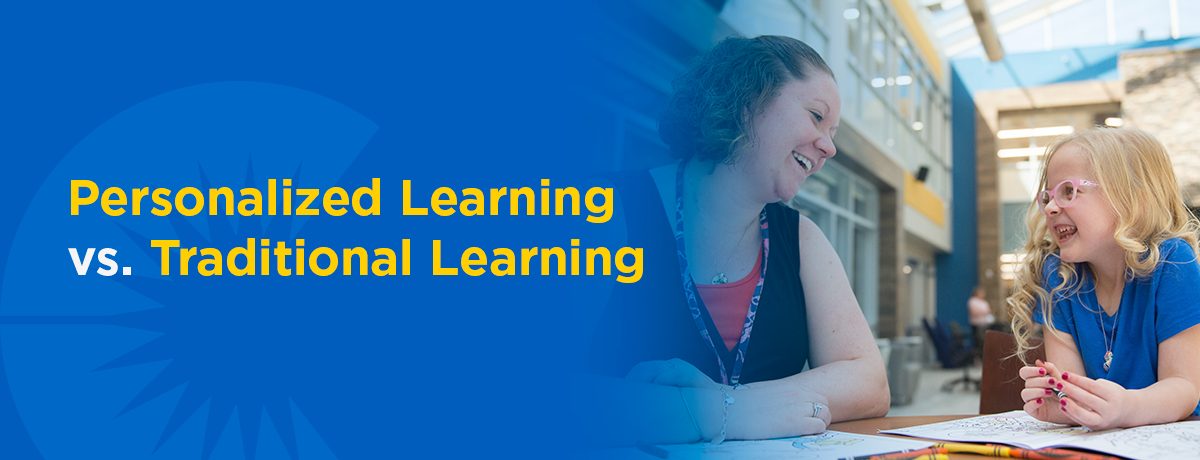2025-2026 School Year Enrollment Now Open. Click Here
2025-2026 School Year Enrollment Now Open. Click Here

Every student is unique and learns best under varying circumstances. There are countless teaching methods, and most techniques fall under one of two categories: traditional learning and personalized learning. Learn more about these two learning approaches and discover which one may be most effective for your child’s needs.
When you conjure up images of school, the format of traditional learning is likely what you first envision. A classroom, a teacher, desks, and students are all situated in a physical setting. Teachers use learning tools such as whiteboards, smartboards, and manipulatives that students can interact with in real time. The day follows a set schedule and generally starts and ends at the same time each day.
A traditional learning system allows students and teachers to form a strong connection. Learning is often active in a traditional setting, with activities that encourage students to interact with the material and each other. Traditional learning is an excellent way for teachers to deliver standard lessons to many children at once.
Personalized learning refers to the teaching practice of tailoring lessons and content to a student’s unique needs and interests. In contrast to traditional learning, personalized learning considers the different learning styles and paces of each student.
With this type of learning, teachers work with students and their families to create an instructional approach that allows students to learn at their own pace and enjoy the full benefits of education. Creating personalized learning plans for each student takes a lot of work, and for teachers at brick and mortar schools, it’s often impossible to devote that much attention to each student.
Most often, cyber schools are the best at implementing personalized learning plans for their students. Technology use makes crafting personalized learning plans easier than ever. Teachers can use different software and instructional tools that appeal to various learning styles. Additionally, students can interact with their lessons for a more engaging learning experience.
With varying objectives and goals, teaching techniques differ between personalized learning and traditional learning. The major characteristics of teaching in the traditional learning style include:
For personalized learning, fundamental teaching techniques involve:
Key differences between these teaching models involve the ability of teachers to craft lesson plans that suit the aptitudes and goals of each child. While traditional learning models involve bringing students into a set learning plan, personalized learning prepares an individual plan for each student.
While the terms “individualized” and “personalized” are often used interchangeably, there are distinct differences between individualized and personalized learning. When it comes to individualized learning, teachers use students’ strengths and weaknesses to determine their progress. They evaluate student assessments to see if students can progress to the next lesson or if they need to spend more time with the current subject.
In contrast, personalized learning considers a student’s unique learning style to craft lessons that match their needs. Rather than relying on assessments as individualized learning does, personalized learning takes student learning styles into account and uses teaching techniques that suit those preferences.
Student engagement is a priority for both traditional learning and personalized learning. When considering the benefits of personalized learning versus traditional learning, it’s helpful to evaluate how well each type engages students.
A large part of student engagement involves active learning, which promotes student engagement by integrating discussion, question-and-answer, experiential learning, and hands-on activities. In contrast to sitting and listening quietly, active learning asks students to play a pivotal role in their learning experience.
Traditional learning teachers craft engaging lesson plans using active learning strategies. They use activities that require students to respond to questions in class and engage in different types of work. Students can participate in group work and question-and-answer instruction throughout the day. Traditional education often involves student engagement to help teachers hold their students’ attention.
Personalized learning naturally engages with active learning principles because it focuses on increasing student engagement with a student-centered approach to lesson construction. Teachers who use personalized instruction focus their attention on students’ individual strengths and learning styles. Their lesson plans and teaching techniques provide natural student engagement by using the students’ passions and interests to guide them.
Personalized learning more naturally implements student engagement because it’s designed to cater to student interests.
Learning styles are often grouped by sensory approaches — the VARK system lists four different learning styles based on visual, auditory, verbal, and tactile senses. While these four categories are a good guide, all students learn in a unique way. Many students share similar tendencies, and knowing those learning styles is helpful for teachers to create engaging lesson plans.
The senses most often engaged with traditional learning are visual and auditory — watching and listening to the teacher’s lecture. If your learning style is rooted in verbal or tactile sensory experiences, you might have difficulty adapting to a different learning style.
Personalized learning means a child’s learning style can flourish through intentional lesson plans. With the ability to focus on activities that will be most useful to the way each student learns, personalized learning plans foster successful students.
CCA’s commitment to a personalized learning structure means your child can enjoy success through lessons specially crafted to their passions and strengths. Our teachers work with students and their families to diagnose students’ learning styles and create lessons they will find engaging and interesting.
Learn more about personalized learning when you contact CCA today.
2025-2026 School Year Enrollment Now Open. Click Here